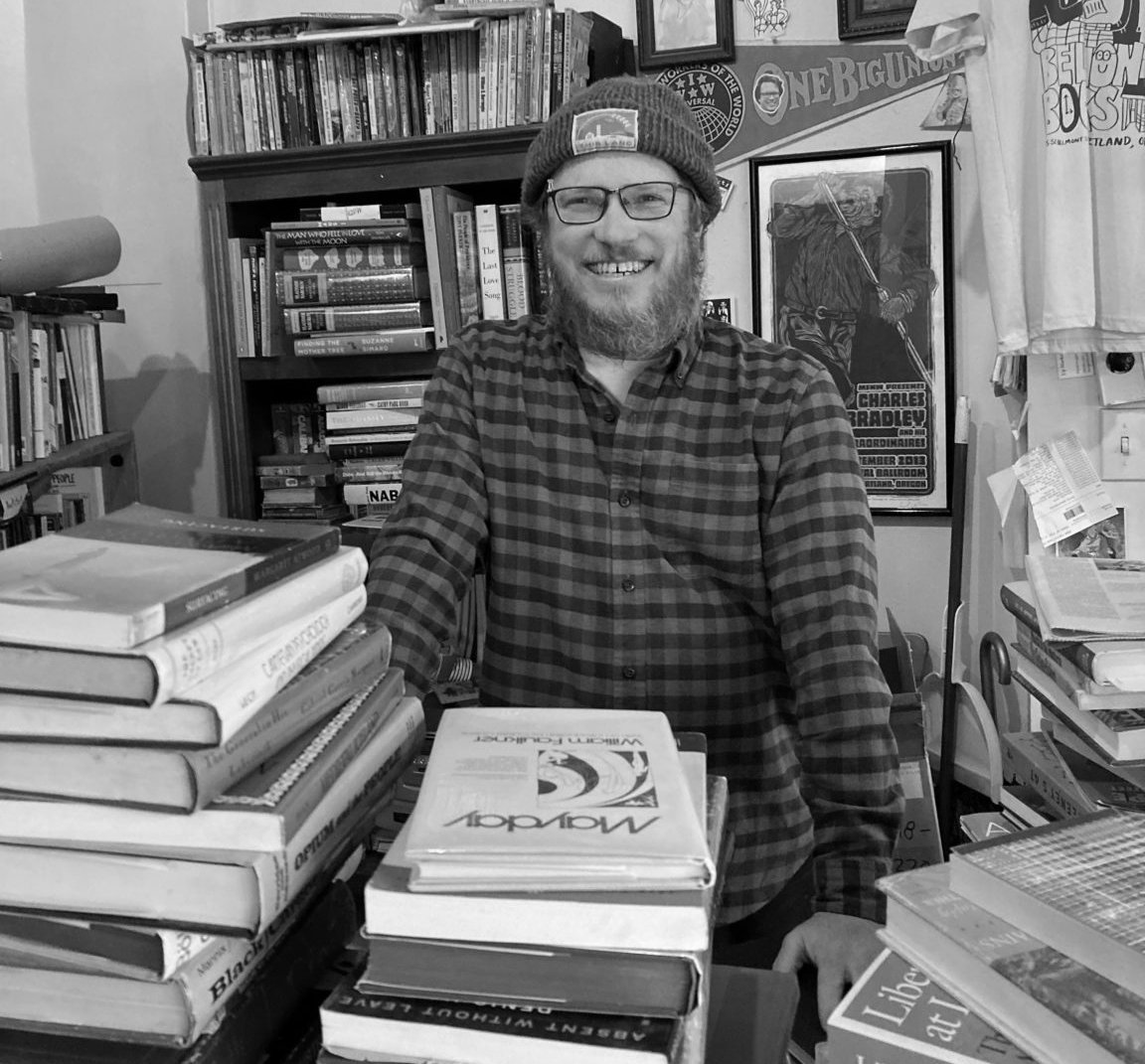As I enter Belmont Books, store owner Joe Witt sees me, picks a book off the top of a stack and places it on the podium in the front of the store. Witt, who moved to Portland in 2003, has been, at various times, a singing train waiter, a KBOO reporter, and a bartender at Farm Cafe. He started selling books on a few shelves of his friend’s indie record store, Mississippi Records. That grew into Belmont Books, where he maintains a collection of diverse and obscure titles in subjects ranging from classic literature to religious studies.
Q: How long has your store been in Sunnyside?
A: Our official opening date was October 2nd, 2018, so this is coming up on year four.
Q: Is this your first time owning a store?
A: Yeah, this is the first time. I got lucky that there was a space available and I was ready to go. So, kind of a luck thing for sure.
Q: Luck? Or was there a little bit of personal planning involved?
A: I was selling books at my friend’s record store for a while before that, but it was a coincidence that I was able to jump into this space.
Q: That’s really cool. That was a good way to get started, then, huh?
A: Yeah, you learn a lot about what sells and what doesn’t and you’re able to make some dumb mistakes. He was really generous.
Q: Have the tastes of Portland changed?
A: Yeah, there’s definitely been changes. But, you know, it’s subtle. It’s all anecdotal, for the most part. How much of the slice of the Portland book market do I have? Only a very small percentage—less than 1%—I’d imagine. So, what I think is going on is not necessarily going to be super accurate.
Q: Do you live in Sunnyside?
A: No, um, that would be nice. I live near Franklin High School.
Q: What do you like most about the neighborhood?
A: I like that it has some economic diversity. It’s got a diversity of businesses.
Q: What would you change about it, if you could? Any real problems with the area?
A: [Pause.] Well, there are… It’s a neighborhood, I mean. It’s a community. So there are people who are, kind of, not super helpful and not doing much except sitting at the bus stop all day, yelling, getting drunk, and… You know, it’s pretty hard for me to come down on most people. I don’t personally enjoy them but they’re part of the neighborhood too, for better or worse.
Q: Ya, I’ve seen the guys that hang out over there and they’re a specific breed. Not all homeless people are like that.
A: I don’t even know that they’re homeless guys. I mean, they show up pretty regularly and just hang out there. It’s not the same people every day; it’s different groups and the mix has changed over time. People move on and go somewhere else to be annoying.
I like that there are people on the streets. It’s good that people are walking around. It’s great that we have H Mart now. People come through here and go there. It’s good that the economy’s improved and people are out doing things again.
I’m a little worried about the end of Covid restrictions. Specifically, we don’t really have any in this state, compared to other countries. You know, people not having to wear masks, I think there’s a little bit of a danger around people being very complacent.
It’s a nice neighborhood. I’m glad we have a lot of older businesses. I’m glad we have landlords who aren’t hustling all the time trying to get every last dollar out of things. It’s great that instead they want to have a diversity of businesses and let people keep working, and other businesses they’ve had for a long time.
It’s a weird little time capsule in Portland that I like a lot.
Witt produces the book that he had previously taken off one of the stacks, The Unvarnished Gospels. Precognition, I can only assume, because when he produces the paperback, it’s exactly what I want. I was merely surprised at the time, but now I wonder if some magical force has been harnessed.
Q: Was there any beginning event that led you to bookselling?
A: I think bookstores are important. I grew up in Oklahoma, and where I lived didn’t have many bookstores, just a few. I always found that really frustrating and depressing. Having sought out reading material I saw a diversity of viewpoints. I always found it frustrating when you couldn’t get a broader range of ideas. So I try to have a broader range of ideas here, and I stand up for freedom of speech, making sure that people feel represented. I think that it’s more interesting when you see things you don’t necessarily agree with, at a bookstore, than when you see the same things you already picked up at a mall at the airport.
Q: What do Belmont Books and Powell’s have in common and how do they differ?
A: Well, we both love books. I think that’s the big one. No I think, really, the big thing is size. And, there are certain parts of the market I don’t go out of my way to serve–what I would term airport fiction. But, you know, this is a good place to buy that kind of thing because when I do have it, I’ll put it out for $1.
Belmont Books (3415 SE Belmont St.; 503-236-0437) is open from 12-6 p.m. every day. To see what’s new, follow Belmont Books on Instagram at @BelmontBooksPDX or stop by to ask Joe for his recommendations.

